Humboldt Park (Chicago park)
|
Humboldt Park | |
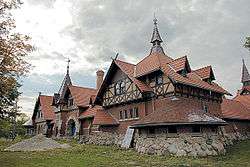 Humboldt Park Stables and Receptory | |
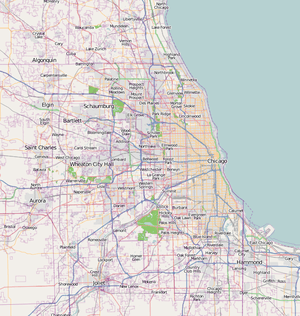 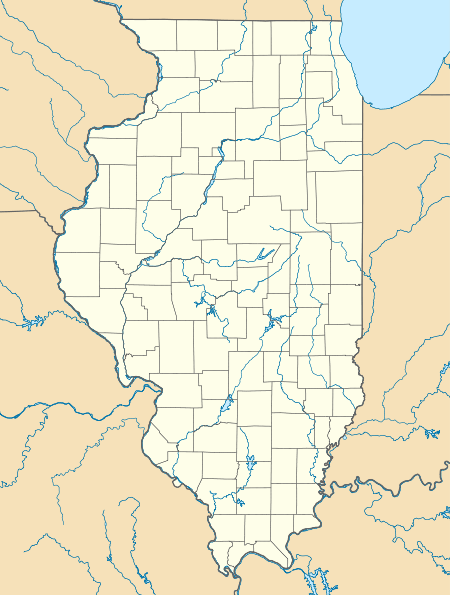  | |
| Location | Roughly bounded by N. Sacramento and Augusta Blvds., and N. Kedzie, North and N. California Aves. and W. Division St., Chicago, Illinois |
|---|---|
| Coordinates | 41°54′23″N 87°42′06″W / 41.9065°N 87.7018°WCoordinates: 41°54′23″N 87°42′06″W / 41.9065°N 87.7018°W |
| Area | 206.9 acres (83.7 ha) |
| Built | 1870s–1920s |
| MPS | Chicago Park District MPS |
| NRHP reference # | 92000074[1] |
| Significant dates | |
| Added to NRHP | February 20, 1992 |
| Designated CL |
November 13, 1996 and February 6, 2008 |
Humboldt Park is a 207-acre (84 ha) park located at 1400 North Sacramento Avenue on the West Side of Chicago, Illinois.
The park was named for Alexander von Humboldt, a German naturalist and botanist.
History
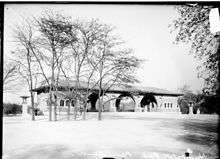
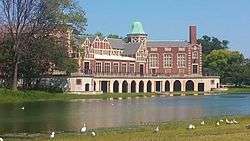
William Le Baron Jenney began developing the park in the 1870s, molding a flat prairie landscape into a "pleasure ground" with horse trails and a pair of lagoons. The park opened to the public in 1877, but landscape architects such as Jens Jensen made significant additions to the park over the next few decades. Between 1905 and 1920, Jensen connected the two lagoons with a river, planted a rose garden, and built a fieldhouse, boathouse, and music pavilion.[2]
The park played a prominent role in the past for Chicago's Polish Community. The Polish Constitution Day Parade once traditionally terminated here at the Tadeusz Kosciuszko statue that was located here before it was moved to Solidarity Promenade on the lakefront Museum Campus in 1981. Additionally, pianist and Polish statesman Ignace Paderewski delivered a famous address where he rallied Chicagoans to the cause of a free and independent Poland.
From 2012 to 2014, Humboldt Park was the home of the punk rock–based music festival Riot Fest and Carnival. For 2015, the three-day music festival was met with opposition from Alderman Roberto Maldonado and local residents over the condition of the grass, lack of accessibility during and after the festival, and gentrification of the surrounding area. This led to the festival's relocation south to Douglas Park.
Landmarks
The park was added to the National Register of Historic Places in 1992.[3] The boathouse pavilion was named a Chicago Landmark on November 13, 1996.[4] The Humboldt Park Stables and Receptory became a Chicago Landmark on February 6, 2008.[5]
National Museum of Puerto Rican Arts and Culture
With the support of Chicago's Puerto Rican community, Puerto Rican leaders in Chicago leased the historic Humboldt Park stables near Paseo Boricua to house the National Museum of Puerto Rican Arts and Culture. About $3.4 million was spent to renovate the exterior of the building and another $3.2 million for the interior.
The facility was opened in 2009.[6]
Statues
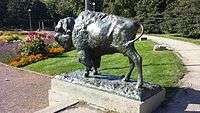
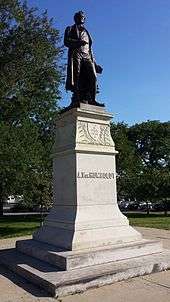
- Near the boathouse stands a ten-foot-tall monument of the park's namesake, Alexander von Humboldt. Sculpted by Felix Gorling and donated by Francis Dewes, the statue encompasses a globe, a twig in his right hand, a lizard atop a manuscript, and plants at his feet. These inclusions were to symbolize Humboldt's travels and role in establishing geophysics and physical geography sciences.[7]
- At the east entrance to the park, a pair of bronze American bison face the gardens. The sculptor, Edward Kemeys, also known for the lions at the entrance of the Art Institute of Chicago, created the Bison for the 1893 World's Columbian Exposition.[7] The bronze reproductions of the Bison were created by Jules Bercham. They have been sitting in Humboldt Park's formal garden since 1915.[8]
- The German American residents of Chicago commissioned to have a monument created of Fritz Reuter, a German novelist and political martyr.[9] The German American sculptor for this monument, Franz Engelsman had also originally created four relief plaques depicting Reuter's achievements that were placed at the base of the sculpture. However, they were stolen in the 1930s and never salvaged.[9]
- The Leif Ericson monument is a bronze Viking sculpture set atop a granite boulder in Humboldt Park. Some believe Ericson to be the first European to discover North America. The Norwegian American community of Chicago commissioned for his monument and was sculpted by the Norwegian artist Sigvald Asbjornsen.[10]
Additionally, the park was once home to a statue of Tadeusz Kosciuszko by Kazimierz Chodzinski that was built thanks to funds raised by Chicago's Polish community and moved in 1981 to the city's lakefront.
Notes
- ↑ National Park Service (2010-07-09). "National Register Information System". National Register of Historic Places. National Park Service.
- ↑ Scott Jacobs. "Humboldt Park Archived 2008-04-02 at the Wayback Machine.". The Week Behind. June 4, 2004. Retrieved on June 8, 2008.
- ↑ National Register of Historical Places in Cook County, IL. Retrieved on June 8, 2008.
- ↑ Humboldt Park Boathouse Pavilion Archived 2008-06-22 at the Wayback Machine.. City of Chicago Department of Planning and Development, Landmarks Division (2003). Retrieved on June 8, 2008.
- ↑ "2009 Chicago Landmark Booklet" (PDF). Commission on Chicago Landmarks Div. 2009. Archived from the original (PDF) on 2009-06-20. Retrieved 2009-06-12.
- ↑ http://www.iprac.org
- 1 2 Graf, John (2000). Chicago's Parks. Chicago: Arcadia Publishing. pp. 26–29. ISBN 0-7385-0716-4.
- ↑ "World's Fair Bison (in Humboldt Park)". Archived from the original on June 15, 2010. Retrieved November 19, 2009.
- 1 2 "Fritz Reuter Monument". Archived from the original on December 1, 2009. Retrieved November 19, 2009.
- ↑ "Early Chicago". Retrieved November 19, 2009.
External links
| Wikimedia Commons has media related to Humboldt Park (Chicago park). |
- Humboldt Park entry from the Encyclopedia of Chicago
- Description of Humboldt Park at the Chicago Park District website